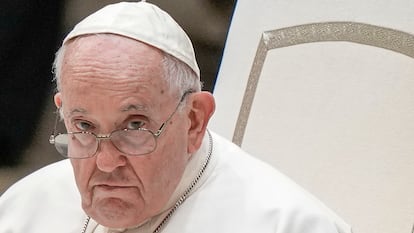Pope Francis punishes conservative US Cardinal Raymond Burke by revoking his Vatican apartment
The pontiff will also reduce the American prelate’s salary. Burke is the visible head of the internal opposition to Francis, financed by the Trumpist sector of the church

Papal punishments, like everything that happens inside the Vatican walls, take time and are served cold. But they end up on the table. In that manner, Pope Francis has stripped conservative American Cardinal Raymond Burke of some of his Vatican privileges, evicting him from his fabulous 400-square-meter subsidized apartment and significantly reducing his salary as a cardinal. The decision is not official, as the Vatican has not officially announced it, but it was leaked on one of the ultra-conservative blogs that — in recent years — have served as a loudspeaker for the traditionalist current within the church, which has been fiercely opposed to the Argentine pope. According to this media outlet, Francis reported his intention to punish Burke at the November 20 meeting with the heads of Vatican ministries.
According to some Italian media, the pope explained in that meeting that the reason for his decision was the disunity created by the cardinal. In addition, Francis considers that Burke has been using the salary he receives from the Vatican as a retired cardinal and his Vatican-subsidized apartment — although he spends most of his time in his native Wisconsin — to attack the church. His salary was among the highest: between 5,000 and 6,000 euros a month.
The U.S. cardinal and bishop turned 75 last June, the retirement age for prelates, and was the prefect of the Supreme Tribunal of the Apostolic Signatura. He was also a patron of the Sovereign Military Order of Malta. Currently, he holds no positions in the Roman Curia. His figure held certain weight in the Vatican before the arrival of Francis, but the latter removed him from his positions and Burke began to publicly lead the opposition current. It was a rough period of violent confrontation that found ideological sustenance in the arrival of Donald Trump to the White House and the attempts of his then-academic advisor, Steve Bannon, to control certain circles of power within the Vatican.
Burke — despite the fact that many of his supporters in the American church, the richest in the world, were leaving his side — never ceased in his criticisms and attempts to destabilize the church. He remained a point of reference for the entire traditionalist world.
The cardinal, for the moment, has not commented on the decision. But in the periodical bulletin that he writes dedicated to the faithful, he affirmed, although without mentioning any specific fact, that “confusion, division and error have even entered the church.” The cardinal, moreover, participated in a conference entitled The Synodal Babel, the day before the Synod began; the assembly promoted by Francis, where for the first time lay people, including women, were able to vote, was harshly criticized.
The cardinal fiercely vindicates the legacy of Benedict XVI and found himself in the media spotlight in 2004 when he refused to give communion to John Kerry, then a candidate for the U.S. presidency. His attacks against Francis, however, began with an unusual case of questioning the pope. In 2016, Burke and other now-retired cardinals published a letter with five dubia (questions) presented against the papal Apostolic Exhortation Amoris laetitia, where Francis opened the door to giving communion to divorced men and women. They did the same thing when the Vatican suggested that same-sex couples could be blessed. In the latest complaint, they expressed concern that “the blessing of same-sex couples might create confusion in any case, not only in that it might make them seem analogous to marriage, but also in that homosexual acts would be presented practically as a good.”
Last November 11, it became known that Francis had removed Joseph E. Strickland as bishop of the U.S. diocese of Tyler (Texas), following an inspection. This bishop is an outspoken critic of Francis and in 2018 joined the accusations against the Pontiff by the former nuncio to the United States, Carlo Maria Viganò, about Francis’ alleged knowledge of the abuses committed by Cardinal Theodore McCarrick.
Sign up for our weekly newsletter to get more English-language news coverage from EL PAÍS USA Edition
Tu suscripción se está usando en otro dispositivo
¿Quieres añadir otro usuario a tu suscripción?
Si continúas leyendo en este dispositivo, no se podrá leer en el otro.
FlechaTu suscripción se está usando en otro dispositivo y solo puedes acceder a EL PAÍS desde un dispositivo a la vez.
Si quieres compartir tu cuenta, cambia tu suscripción a la modalidad Premium, así podrás añadir otro usuario. Cada uno accederá con su propia cuenta de email, lo que os permitirá personalizar vuestra experiencia en EL PAÍS.
¿Tienes una suscripción de empresa? Accede aquí para contratar más cuentas.
En el caso de no saber quién está usando tu cuenta, te recomendamos cambiar tu contraseña aquí.
Si decides continuar compartiendo tu cuenta, este mensaje se mostrará en tu dispositivo y en el de la otra persona que está usando tu cuenta de forma indefinida, afectando a tu experiencia de lectura. Puedes consultar aquí los términos y condiciones de la suscripción digital.









































